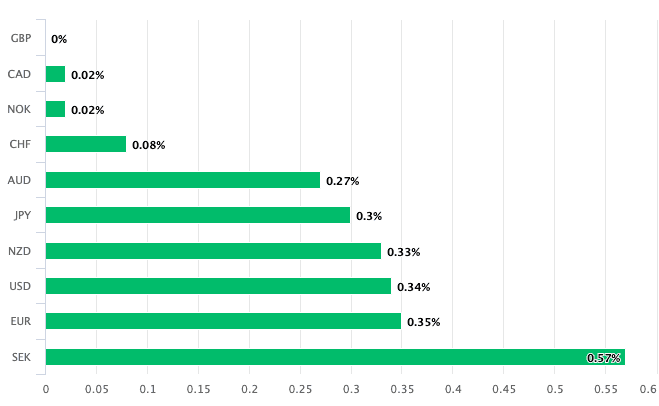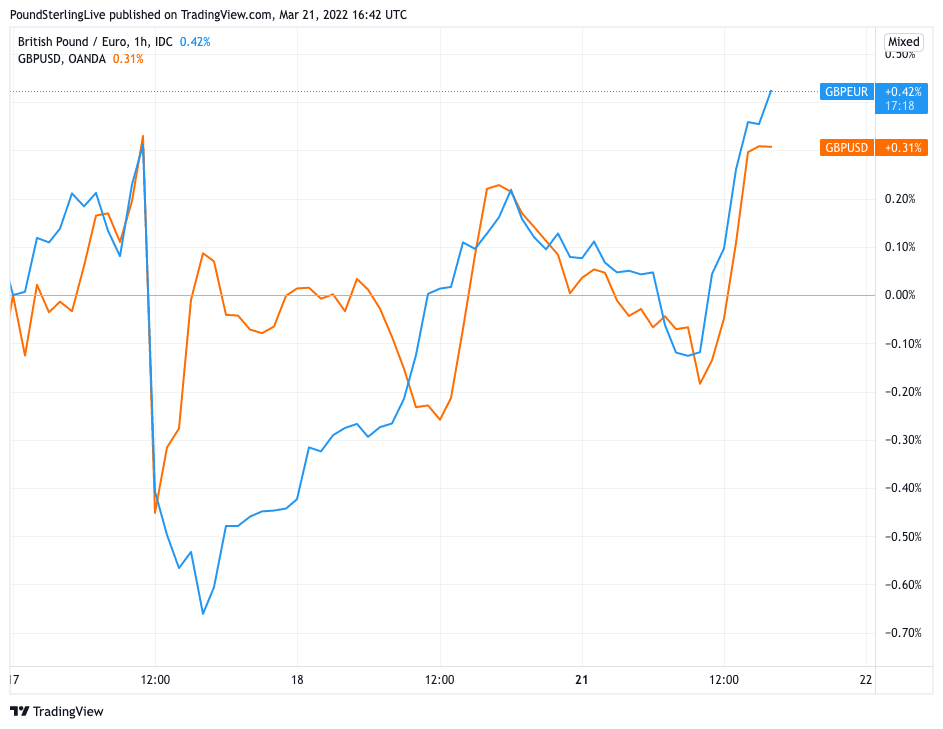Pound Recovers post-BoE Losses
- Written by: Gary Howes
- GBP recovery extends
- Bank of England sell-off runs its course
- Markets establish equilibrium re. Ukraine

Image © Adobe Images
The British Pound looks to recover further ground lost against the Euro and Dollar near-term as markets anticipate further Bank of England interest rate hikes and the war in Ukraine is offering diminishing returns to market 'bears'.
The war in Ukraine is 27 days old today and with little new material developments it appears the markets have to a degree fully digested the implications of the current equilibrium.
This equilibrium accounts for the slow and chaotic advance of Russian forces, the brutal destruction of Ukrainian towns and signs the majority of market-relevant Western sanctions have now been passed against Russia.
This matters for Sterling which has proven to be one of the biggest underperformers in global FX since late February when Russia invaded Ukraine and markets adjusted accordingly.
News reports out on Tuesday meanwhile suggest progress is being made towards a negotiated settlement between the warring sides. A meeting between the Ukrainian and Russian presidents will be possible after a draft roadmap toward a settlement is prepared so that they can discuss it, Mykhailo Podolyak, advisor to the Ukrainian presidential office chief, said on Telegram on Tuesday.
The news suggest progress is being made.
"When the working groups draw up some preliminary documents within the framework of the negotiating process and these are passed on to the presidents, they will evaluate whether this is a roadmap that could be discussed tete-a-tete. Then such a meeting could take place," says Podolyak.
Analysis from Goldman Sachs finds the Pound should be supported in the near-term should the situation in Ukraine not deteriorate notably.
"Sterling’s relatively high cyclical beta should dominate these factors to some extent, and - short of further escalation risk - GBP/USD can continue to unwind the risk premium that has been built over recent weeks," says analyst Zach Pandl in a weekly currency research briefing.

Above: GBP was the best performing major currency at the start of the new week.
- Reference rates at publication:
GBP to EUR: 1.1950 - High street bank rates (indicative): 1.1532 - 1.1615
- Payment specialist rates (indicative): 1.1842 - 1.1880
- Find out more about specialist rates and service, here
- Set up an exchange rate alert, here
The Pound to Euro exchange rate was as low as 1.1820 last week but is back up at 1.1950 at publication, the Pound to Dollar exchange rate went as low as 1.30 last week but has since recovered to 1.32 at publication.
"With a modest return to risk appetite in markets, the pound has unsurprisingly found itself a benefactor. Although the war in Ukraine continues, there is a glimmer of hope that a peace deal could be reached, and indeed British Intelligence have recently pointed to Russian failure to make significant further progress against resilient Ukrainian forces," says Lawrence Kaplin, Chief Market Strategist at Equals Money.
Peace talks between Russia and Ukraine look set to continue, however comments from the Russian side suggest there is little scope of a breakthrough near term.
Russian Presidential spokesman Dmitry Peskov said Monday the two sides were still far apart, underlying the downside risks to risk sentiment and therefore the Pound.
"The degree of progress in the negotiations perhaps is not what would be desirable and not what the development of the situation for the Ukrainian side would call for," said Peskov in a briefing to journalists.
There were hopes Ukrainian President Volodymyr Zelensky would soon sit down with Russian President Vladimir Putin, but this does not appear to be a near-term prospect.
"No significant progress has been ensured thus far. They [Putin and Zelensky] would simply have nothing to formalize, there are no agreements that they could formalize," said Peskov.
The other key driver of Sterling exchange rates at the present time are expectations for future interest rates at the Bank of England, and here the Pound has recovered all its post-Bank of England losses:
Above: GBP/EUR (blue) and GBP/USD (orange) since March 17's Bank of England rate hike.
The Bank hiked 25 basis points last Thursday, as expected, but the Pound fell in the wake of the decision.
Our coverage of the fallout suggests there was an element of 'sell the fact' in the market's reaction, with the currency further weighed down by the 'dovish' tinge to the guidance offered by the Bank.
The Bank has turned more cautious on the economic outlook, warning the market against expecting the approximate 120 basis points of rate hikes priced for the remainder of 2022.
This is because the Bank sees the surging inflationary levels as having the potential to impact negatively on economic growth, with the resultant downturn naturally burning inflation out.
Asking the market to recalibrate lower its expectations for the number of future rate hikes inevitably triggers a mechanical move lower in the Pound.
But the recovery of the Pound seen over recent days would suggest the market's initial 'sell the fact' reaction has played itself out and investors are in the market to buy again.
Indeed, against a host of G10 central banks the Bank of England remains one of the more hawkish and at least two interest rate hikes are expected by even the most dovish of analysts we follow.
But although the British pound has recovered lost ground, a number of analysts we follow say the currency will struggle to retain a positive tempo.
Economist Derek Halpenny at MUFG says there is now a higher hurdle for Sterling to strengthen more notably in light of the Bank of England's increased focus on downside risks to growth caused by higher inflation.
"As indicated by the BoE on occasion of its meeting on 17 March, the resulting weakening of the growth picture is roughly equally as important as the significant worsening of the inflation picture," says Asmara Jamaleh, an economist at Intesa Sanpaolo.
{wbamp-hide start}
{wbamp-hide end}{wbamp-show start}{wbamp-show end}
Jamaleh says the Russia-Ukraine conflict is "shock number three after Brexit and the pandemic: more limited upside margin for the pound".
"The Russia Ukraine war has worsened the outlook for the pound. The British economy is less vulnerable to the conflict than the euro area, but is more exposed than the United States," he adds.
Intesa Sanpaolo see some potential upside for Sterling against the Euro, but upside looks set to be limited at 1.22-1.23.
Kamal Sharma, FX Strategist at Bank of America, says "we think that UK rate hikes will not provide a boost to GBP."
"Simply put, the Bank of England is hiking in our view, for the wrong reasons and sounding defensive," says Sharma.
If correct, any bouts of strength in the UK currency would be expected to be short-lived, and at some point a more protected trend of weakness can be anticipated.






